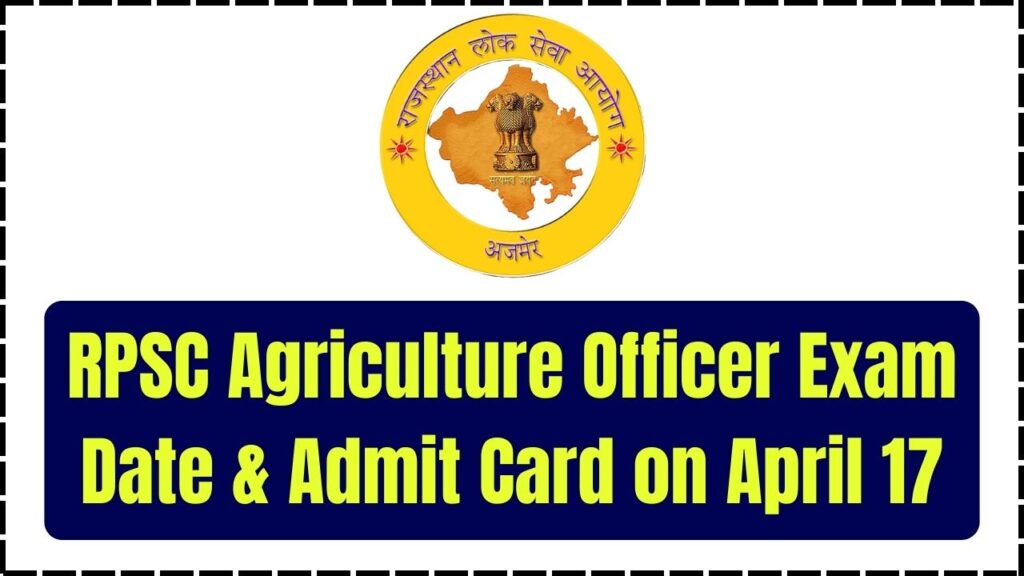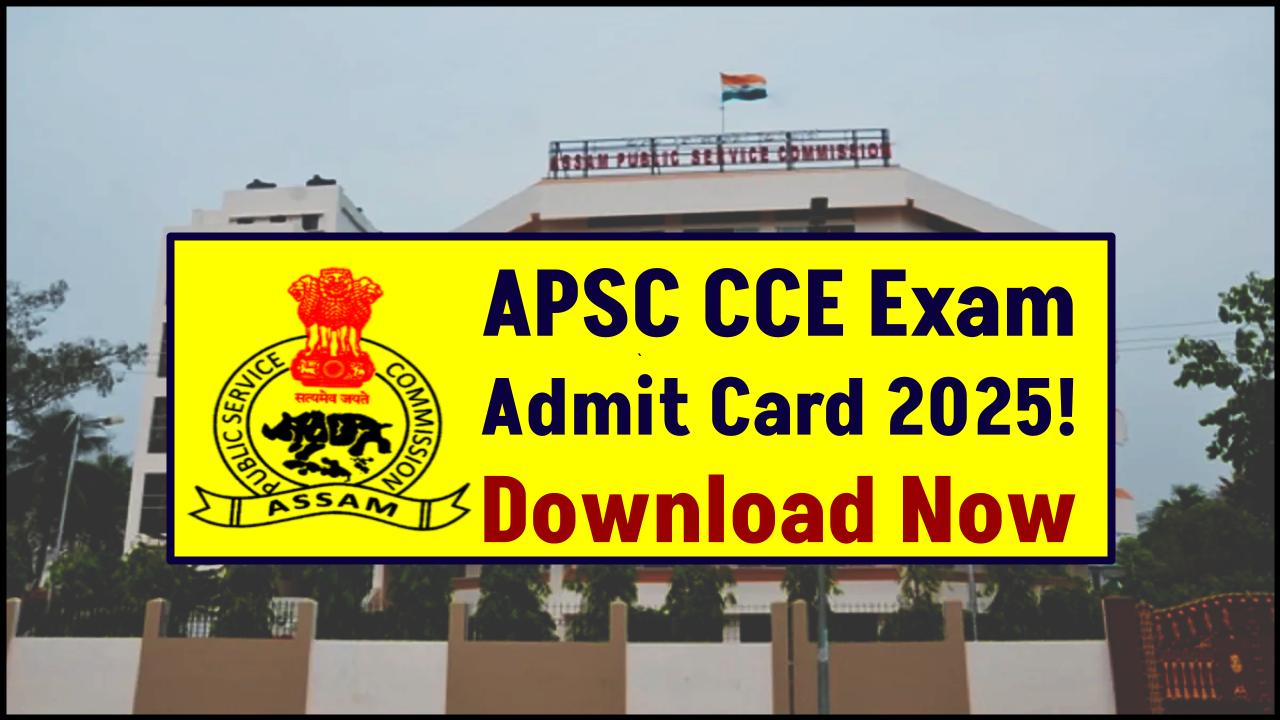The Rajasthan Public Service Commission (RPSC) has officially announced the Agriculture Officer Exam Date, which is scheduled for April 20, 2025. This much-awaited update has sparked excitement among aspiring candidates who aim to secure the prestigious role of an Agriculture Officer in the state of Rajasthan. The RPSC Agriculture Officer exam is a fantastic opportunity for individuals passionate about agriculture to contribute to the state’s agricultural development.
This article will guide you through everything you need to know about the exam, including the exam date, admit card release, detailed preparation tips, and what to expect on exam day. We will also provide practical advice, breaking down the steps and offering clear examples to make your exam preparation journey as smooth as possible.

RPSC Agriculture Officer Exam Date Out
| Key Information | Details |
|---|---|
| Exam Date | April 20, 2025, from 11:00 AM to 1:30 PM |
| Admit Card Release | April 17, 2025 |
| Official RPSC Website | rpsc.rajasthan.gov.in |
| Total Number of Vacancies | 225 (approx.) |
| Eligibility Criteria | Bachelor’s degree in Agriculture |
| Exam Pattern | Multiple-choice questions, with negative marking |
| Key Sections in the Exam | General Knowledge, Agriculture Science, and more |
| Website for Admit Card Download | Admit Card Link |
| Last Date for Application Submission | Check official website for updates |
The RPSC Agriculture Officer Exam is a major stepping stone for anyone seeking a career in agriculture within Rajasthan. Scheduled for April 20, 2025, with admit cards available from April 17, 2025, now is the time to ramp up your preparations. With a solid understanding of the syllabus, a well-structured study plan, and plenty of practice, you’ll be well-equipped to succeed.
Stay updated by regularly visiting the official RPSC website, and good luck with your preparation!
What is the RPSC Agriculture Officer Exam?
The RPSC Agriculture Officer Exam is a competitive examination conducted by the Rajasthan Public Service Commission (RPSC) for selecting candidates for the role of Agriculture Officer in the state’s Department of Agriculture. Agriculture Officers play a key role in advising farmers, ensuring the optimal use of agricultural resources, and implementing various agricultural policies and schemes. This makes the role both important and impactful in the state’s agricultural landscape.
For aspiring candidates, the exam represents an opportunity to join the government and serve the agricultural community in one of the most agriculturally significant states in India. The exam is comprehensive, focusing on agriculture science, general knowledge, and Rajasthan-specific agriculture, among other key areas.
What Can You Expect from the RPSC Agriculture Officer Exam?
1. Exam Structure and Content
The RPSC Agriculture Officer exam consists of three major sections:
- General Knowledge (GK): This section covers a wide range of topics including history, geography, current affairs, general science, and national events. It is crucial for understanding the broader socio-economic and political environment.
- Agriculture Science: The primary focus of the exam, this section evaluates candidates’ knowledge of agricultural practices, including crop management, soil science, agricultural economics, pest control, and plant pathology.
- Rajasthan-Specific Agriculture: Since the position is specific to Rajasthan, candidates will need to be familiar with the unique agricultural practices, climate conditions, and farming methods in the region. Topics here include crop patterns, irrigation techniques, and state government policies related to agriculture.
2. Negative Marking System
One important aspect of the RPSC Agriculture Officer exam is the negative marking system. For every incorrect answer, candidates will lose 0.25 marks. This means it’s better to skip questions you are unsure about rather than guessing blindly.
Key Dates to Remember
- Admit Card Release: Candidates can download their admit cards from April 17, 2025. This document is essential for entering the exam hall, so make sure to download and print it well in advance.
- Exam Date: The RPSC Agriculture Officer exam is scheduled for April 20, 2025. The exam will be held from 11:00 AM to 1:30 PM.
How to Prepare for the RPSC Agriculture Officer Exam
1. Understand the Syllabus
One of the first steps in preparing for the exam is to familiarize yourself with the official syllabus. The RPSC website provides a detailed syllabus outlining the subjects and topics that will be tested.
Key Areas to Focus On:
- General Knowledge: Focus on current affairs, major national and international events, geography, and history.
- Agriculture Science: Study key topics like crop science, soil management, plant protection, and agricultural economics.
- Rajasthan-Specific Agriculture: Gain an understanding of local agricultural practices, irrigation systems, and the state’s crop production.
2. Create a Study Plan
A well-organized study plan is key to staying on track. Here’s a basic framework:
- Morning Session: Dedicate time to General Knowledge. Read newspapers, magazines, and follow agriculture-related news to stay up-to-date.
- Afternoon Session: Focus on Agriculture Science. Study textbooks, online courses, and use reference materials to strengthen your understanding of core topics.
- Evening Session: Review Rajasthan-specific agriculture and practice solving past year papers.
3. Practice with Previous Year Papers
Solving previous year question papers is an excellent way to familiarize yourself with the exam format. It will also help you understand the level of difficulty and pinpoint areas that need more attention. Time yourself while practicing to improve your speed and efficiency.
4. Stay Updated
The world of agriculture is dynamic and constantly evolving. Make it a habit to read agricultural journals, attend webinars, and participate in online discussions related to agriculture. This will ensure you are well-versed in the latest trends, technologies, and government policies.
What to Do on Exam Day
1. Arrive Early
On exam day, ensure you arrive at the exam center well before the reporting time. This will give you ample time to settle in, check your exam center details, and avoid any unnecessary stress.
2. Carry Necessary Documents
Along with your admit card, you will need to carry a valid ID proof. Acceptable IDs include Aadhar card, voter ID, or a passport.
Join NHSRCL: Exciting Career Opportunities with Attractive Salaries Up to ₹1.6 Lakh
AIIMS Delhi Careers: 199 Faculty Vacancies with Competitive Salaries Up to ₹2.2 Lakh
Scholarship Alert: A Step‑by‑Step Guide to Earning a 100% Fee Waiver at Eminent
3. Stay Calm and Focused
It’s natural to feel nervous before an important exam but staying calm and focused will help you perform better. Take deep breaths, manage your time wisely, and answer only those questions you’re confident about.
Frequently Asked Questions (FAQs)
Q1. What is the eligibility criteria for the RPSC Agriculture Officer exam?
Answer: Candidates must have a Bachelor’s degree in Agriculture from a recognized university. Additionally, candidates must meet the age requirements set by the RPSC, which is typically between 21 and 40 years. Age relaxations apply for candidates from certain categories.
Q2. How do I download my admit card?
Answer: You can download your admit card by visiting the official RPSC website (rpsc.rajasthan.gov.in). Enter your login details, and you will be able to download and print your admit card from April 17, 2025.
Q3. Is there negative marking in the exam?
Answer: Yes, there is negative marking in the RPSC Agriculture Officer exam. Each incorrect answer will result in a deduction of 0.25 marks.
Q4. What is the exam pattern for the RPSC Agriculture Officer exam?
Answer: The exam consists of multiple-choice questions (MCQs) across sections like General Knowledge, Agriculture Science, and Rajasthan-specific topics. Each section is allocated a set number of marks, and there is negative marking for incorrect answers.
Q5. How can I prepare for the Agriculture Science section?
Answer: Focus on core agriculture topics such as soil management, crop protection, irrigation, and plant diseases. Use textbooks, online resources, and previous year papers to reinforce your knowledge.









